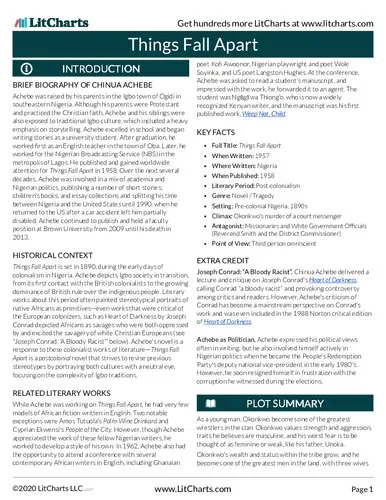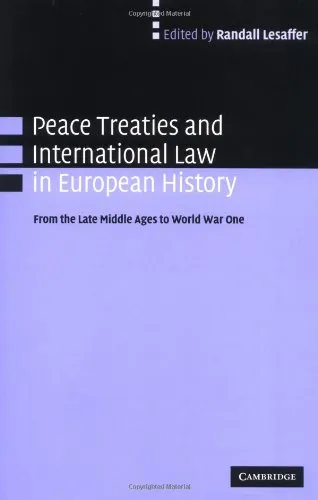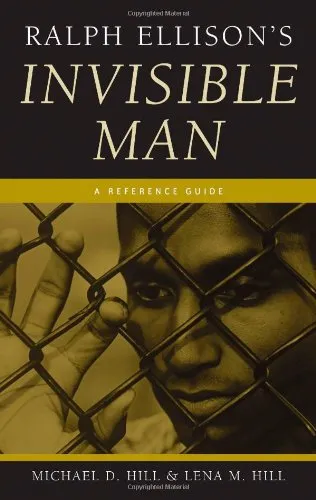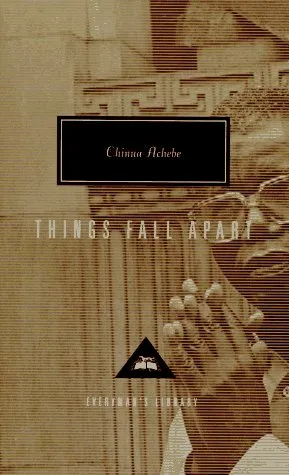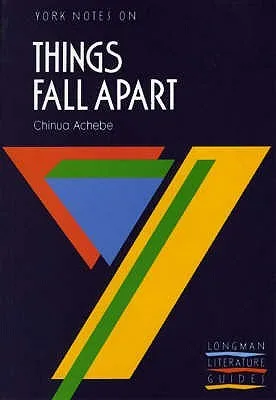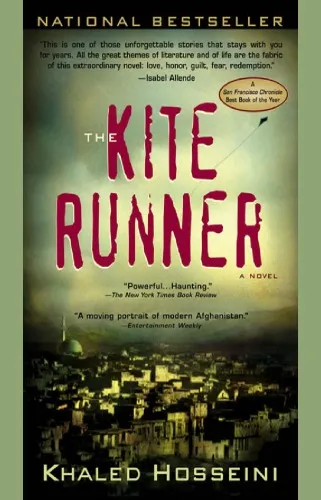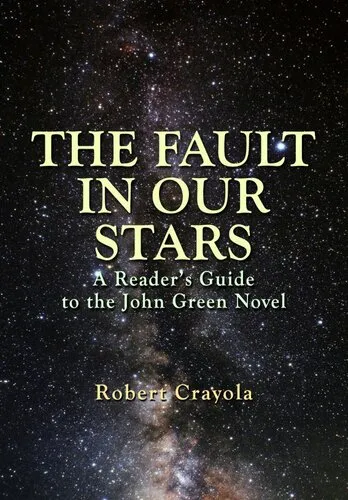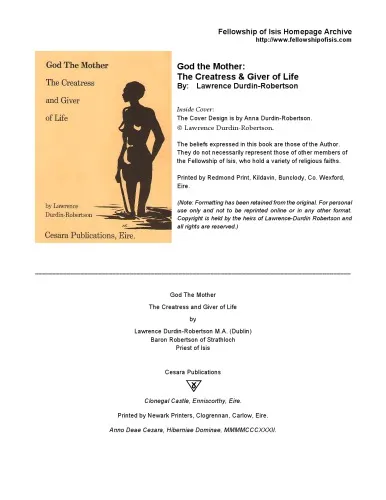Things Fall Apart — LitCharts Study Guide
4.0
بر اساس نظر کاربران

شما میتونید سوالاتتون در باره کتاب رو از هوش مصنوعیش بعد از ورود بپرسید
هر دانلود یا پرسش از هوش مصنوعی 2 امتیاز لازم دارد، برای بدست آوردن امتیاز رایگان، به صفحه ی راهنمای امتیازات سر بزنید و یک سری کار ارزشمند انجام بدینکتاب های مرتبط:
Persian Summary
مقدمه کتاب «چیزها فرو میپاشند – راهنمای مطالعه LitCharts»
کتاب «چیزها فرو میپاشند» اثر چینوا آچهبه، یکی از برجستهترین آثار ادبیات آفریقایی و جهان است که به بررسی پیچیدگیهای فرهنگی و اجتماعی قبیله ایبو در نیجریه میپردازد. این کتاب با ارائه نگاهی عمیق به جامعهای در آستانه تغییرات کلان، خوانندگان را به تأمل درباره تأثیر استعمار و تعاملات میان فرهنگهای مختلف دعوت میکند. در این راهنمای مطالعه، تلاش شده است تا با مرور خلاصه کامل کتاب، استخراج نکات کلیدی، نقل قولهای ماندگار و دلایل اهمیت آن، دیدگاه جامعی به خوانندگان ارائه شود.
خلاصه تفصیلی کتاب
داستان «چیزها فرو میپاشند» حول محور شخصیت اصلی، اوکونکو، میگردد که یکی از برجستهترین جنگجویان و رهبران قبیله ایبو است. اوکونکو، فردی با اراده و اصولی است که تلاش میکند تا اشتباهات پدر ناتوان خود را جبران کرده و موفقیت و احترام قبیله را برای خود کسب کند. با ورود استعمارگران خارجی و مبلغان مذهبی به سرزمین اوکونکو، جامعه قبیلهای او به چالشهای فراوانی کشیده میشود؛ چالشهایی که در نهایت به فروپاشی ساختارهای فرهنگی و اجتماعی قبیله منجر میشود. کتاب با بیانی زیبا و تأثیرگذار، جدال میان سنت و مدرنیته، هویت و استعمار را به شکلی هنرمندانه به تصویر میکشد.
نکات کلیدی
- تحلیل عمیق از تأثیر استعمار بر فرهنگهای بومی و تعاملات میان آنها.
- بررسی نقش سنتها و آیینهای قبیلهای در مواجهه با تغییرات اجباری.
- شناخت شخصیتهای پیچیده و تأثیرگذار در شکلگیری سرنوشت جامعه.
- جستوجوی هویت و جایگاه در جهانی در حال تغییر و تحول.
نقل قولهای معروف از کتاب
"چهره تو همان داستان زندگی توست."
"برگها همانطور که سقوط میکنند، درباره تأثیرات ناپایدار هشدار میدهند."
چرا این کتاب مهم است
«چیزها فرو میپاشند» نه تنها به عنوان یکی از شاهکارهای ادبیات آفریقایی شناخته میشود بلکه به عنوان نقطه عطفی در بررسی پیچیدگیهای هویت فرهنگی و تأثیر استعمار بر جوامع بومی تلقی میشود. این اثر با نگاهی منتقدانه به مصالحه میان دنیای قدیم و جدید، به طرح سؤالاتی بنیادین درباره معنا و ارزشهای فرهنگی در دورههای گذار میپردازد. همچنان که قدرت داستانسرایی آچهبه، مخاطبان را در عمق داستان اوکونکو فرو میبرد، به همه ما یادآوری میکند که درک و احترام به تنوع فرهنگی یک ضرورت جهانی است.
Welcome to the detailed study guide for Chinua Achebe's seminal novel, Things Fall Apart. This guide offers an in-depth exploration of the book's themes, characters, significance, and its timeless impact on literature and culture.
Detailed Summary of the Book
Things Fall Apart, first published in 1958, is a groundbreaking novel by Nigerian author Chinua Achebe. The story is set in pre-colonial Nigeria, focusing on the life of Okonkwo, an ambitious and influential leader in the Igbo community of Umuofia. Through Okonkwo's personal story, Achebe explores the impact of British colonialism and Christian missionary efforts on traditional African societies during the late 19th century.
The novel is divided into three parts. The first part introduces readers to Umuofia and Okonkwo, highlighting his rise as a respected warrior and farmer, and his determination to overcome the perceived failures of his father. Achebe vividly brings to life the customs and traditions of the Igbo people, painting a complex and rich community often misunderstood by colonial powers.
The second part begins with Okonkwo's exile to his mother's village after an accidental crime, setting the stage for the arrival of the Europeans. The introduction of missionaries and their efforts to convert the locals to Christianity creates tension within the community, leading to a cultural clash that challenges the very fabric of Igbo society.
In the third part, Okonkwo returns to a drastically changed Umuofia, finding his people divided and the new colonial government imposing its laws. Struggling to adapt to the changes, Okonkwo becomes disillusioned, ultimately leading to a tragic and symbolic ending that underscores the novel's themes of change, loss, and identity.
Key Takeaways
- The novel provides a nuanced portrayal of African traditional life before colonial influence.
- Achebe critiques both the impact of colonialism and the internal flaws of traditional societies.
- Key themes include cultural change, masculinity, tradition vs. modernity, and the struggle for identity.
- The story highlights the resilience of human communities despite external pressures and internal conflicts.
Famous Quotes from the Book
- "The white man is very clever. He came quietly and peaceably with his religion. We were amused at his foolishness and allowed him to stay. Now he has won our brothers, and our clan can no longer act like one."
- "He has put a knife on the things that held us together and we have fallen apart."
- "A man who makes trouble for others is also making trouble for himself."
Why This Book Matters
Things Fall Apart is not only a cornerstone of African literature; it is also a critical work that reshaped global perceptions of African culture and history. Achebe's narrative offers a powerful counterpoint to colonial literature that often depicted African societies as primitive or savage. Instead, Achebe portrays a rich cultural tapestry that was disrupted by external forces.
The novel's global relevance lies in its universal themes of change, struggle, and resilience, all of which resonate with readers regardless of cultural background. Its enduring impact continues to inspire discussions on imperialism, race, and identity, making it an essential read for understanding both historical and contemporary issues.
A timeless classic, Things Fall Apart invites readers to reflect on the complexities of cultural interactions and the profound consequences of change, making it an incomparable addition to the global literary canon.
دانلود رایگان مستقیم
شما میتونید سوالاتتون در باره کتاب رو از هوش مصنوعیش بعد از ورود بپرسید
دسترسی به کتابها از طریق پلتفرمهای قانونی و کتابخانههای عمومی نه تنها از حقوق نویسندگان و ناشران حمایت میکند، بلکه به پایداری فرهنگ کتابخوانی نیز کمک میرساند. پیش از دانلود، لحظهای به بررسی این گزینهها فکر کنید.
این کتاب رو در پلتفرم های دیگه ببینید
WorldCat به شما کمک میکنه تا کتاب ها رو در کتابخانه های سراسر دنیا پیدا کنید
امتیازها، نظرات تخصصی و صحبت ها درباره کتاب را در Goodreads ببینید
کتابهای کمیاب یا دست دوم را در AbeBooks پیدا کنید و بخرید
1825
بازدید4.0
امتیاز0
نظر98%
رضایتنظرات:
4.0
بر اساس 0 نظر کاربران
Questions & Answers
Ask questions about this book or help others by answering
No questions yet. Be the first to ask!
